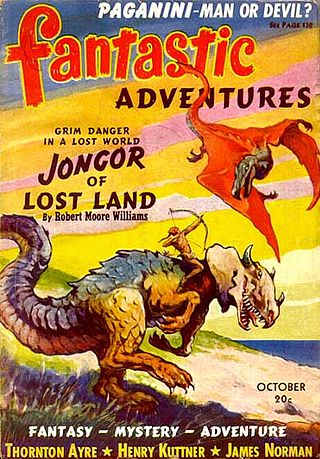
A fanzine is a non-professional and non-official publication produced by enthusiasts of a particular cultural phenomenon for the pleasure of others who share their interest. The term was coined in an October 1940 science fiction fanzine by Russ Chauvenet and first popularized within science fiction fandom, and from there the term was adopted by other communities.
Tom Godwin was an American science fiction author active throughout the 1950s into the 1970s. In his career, Godwin published three novels and around thirty short stories. He is best known for his short story, "The Cold Equations". Published in 1954, the short story was Godwin’s fourth work to be published and was one whose controversial dark ending helped redefine the genre.

The Magazine of Fantasy & Science Fiction is a U.S. fantasy and science-fiction magazine, first published in 1949 by Mystery House, a subsidiary of Lawrence Spivak's Mercury Press. Editors Anthony Boucher and J. Francis McComas had approached Spivak in the mid-1940s about creating a fantasy companion to Spivak's existing mystery title, Ellery Queen's Mystery Magazine. The first issue was titled The Magazine of Fantasy, but the decision was quickly made to include science fiction as well as fantasy, and the title was changed correspondingly with the second issue. F&SF was quite different in presentation from the existing science-fiction magazines of the day, most of which were in pulp format: it had no interior illustrations, no letter column, and text in a single-column format, which in the opinion of science-fiction historian Mike Ashley "set F&SF apart, giving it the air and authority of a superior magazine".

Nick Mamatas is an American horror, science fiction and fantasy author and editor for Haikasoru's line of translated Japanese science fiction novels for Viz Media. His fiction has been nominated for a number of awards, including several Bram Stoker Awards. He has also been recognised for his editorial work with a Bram Stoker Award, as well as World Fantasy Award and Hugo Award nominations. He funded his early writing career by producing term papers for college students, which gained him some notoriety when he described this experience in an essay for Drexel University's online magazine The Smart Set.

A science fiction magazine is a publication that offers primarily science fiction, either in a hard-copy periodical format or on the Internet. Science fiction magazines traditionally featured speculative fiction in short story, novelette, novella or novel form, a format that continues into the present day. Many also contain editorials, book reviews or articles, and some also include stories in the fantasy and horror genres.

Ellen Datlow is an American science fiction, fantasy, and horror editor and anthologist. She is a winner of the World Fantasy Award and the Bram Stoker Award.

Jeffrey Ford is an American writer in the fantastic genre tradition, although his works have spanned genres including fantasy, science fiction and mystery. His work is characterized by a sweeping imaginative power, humor, literary allusion, and a fascination with tales told within tales. He is a graduate of Binghamton University, where he studied with the novelist John Gardner.

Shimmer Magazine was a quarterly magazine which published speculative fiction, with a focus on material that is dark, humorous or strange. Established in June 2005, Shimmer was published in digest format and PDF and was edited by Beth Wodzinski.

Apex Magazine, also previously known as Apex Digest, is an American horror and science fiction magazine. This subscription webzine, Apex Magazine, contains short fiction, reviews, and interviews. It has been nominated for several awards including the Hugo Award.

Beyond Fantasy Fiction was a US fantasy fiction magazine edited by H. L. Gold, with only ten issues published from 1953 to 1955. The last two issues carried the cover title of Beyond Fiction, but the publication's name for copyright purposes remained as before.

Fantastic Adventures was an American pulp fantasy and science fiction magazine, published from 1939 to 1953 by Ziff-Davis. It was initially edited by Raymond A. Palmer, who was also the editor of Amazing Stories, Ziff-Davis's other science fiction title. The first nine issues were in bedsheet format, but in June 1940 the magazine switched to a standard pulp size. It was almost cancelled at the end of 1940, but the October 1940 issue enjoyed unexpectedly good sales, helped by a strong cover by J. Allen St. John for Robert Moore Williams' Jongor of Lost Land. By May 1941 the magazine was on a regular monthly schedule. Historians of science fiction consider that Palmer was unable to maintain a consistently high standard of fiction, but Fantastic Adventures soon developed a reputation for light-hearted and whimsical stories. Much of the material was written by a small group of writers under both their own names and house names. The cover art, like those of many other pulps of the era, focused on beautiful women in melodramatic action scenes. One regular cover artist was H.W. McCauley, whose glamorous "MacGirl" covers were popular with the readers, though the emphasis on depictions of attractive and often partly clothed women did draw some objections.

Theodora Goss is a Hungarian American fiction writer and poet. Her writing has been nominated for major awards, including the Nebula, Locus, Mythopoeic, World Fantasy, and Seiun Awards. Her short fiction and poetry have appeared in numerous magazines and anthologies, including Year's Best volumes.

Fiona Kelleghan is an American academic and critic specializing in science fiction and fantasy. She was a metadata librarian and a cataloguer at the University of Miami's Otto G. Richter Library. She left the university in 2011.
Michael Raymond Donald Ashley is a British bibliographer, author and editor of science fiction, mystery, and fantasy.

A horror fiction magazine is a magazine that publishes primarily horror fiction with the main purpose of frightening the reader. Horror magazines can be in print, on the internet, or both.

Famous Fantastic Mysteries was an American science fiction and fantasy pulp magazine published from 1939 to 1953. The editor was Mary Gnaedinger. It was launched by the Munsey Company as a way to reprint the many science fiction and fantasy stories which had appeared over the preceding decades in Munsey magazines such as Argosy. From its first issue, dated September/October 1939, Famous Fantastic Mysteries was an immediate success. Less than a year later, a companion magazine, Fantastic Novels, was launched.
Will McIntosh is a science fiction and young adult author, a Hugo-Award-winner, and a winner or finalist for many other awards. Along with ten novels, including Defenders,Love Minus Eighty, and Burning Midnight, he has published dozens of short stories in magazines such as Asimov's Science Fiction, Strange Horizons, Lightspeed Magazine, Clarkesworld, and Interzone. His stories are frequently reprinted in different "Year's Best" anthologies.

Maurice Broaddus is an American author who has published fiction across a number of genres including young adult, horror, fantasy and science fiction. Among his books are The Knights of Breton Court urban fantasy trilogy from Angry Robot, the steampunk novel Pimp My Airship from Apex Publications, and the young adult novel The Usual Suspects from HarperCollins. His Afrofuturist space trilogy Astra Black will be released by Tor Books beginning in March, 2022. He has also published dozens of short stories in magazines such as Asimov's Science Fiction, Black Static, Fantasy & Science Fiction, and Weird Tales along with anthologies including Black Panther: Tales of Wakanda, The Year's Best Science Fiction & Fantasy and Sunspot Jungle.
Matthew Kressel is a multiple Nebula, World Fantasy Award, and Eugie Award nominated author and coder. His short stories have been published in Reactor, io9, Lightspeed, Clarkesworld Magazine, Beneath Ceaseless Skies, Interzone, Apex Magazine, and many other magazines and anthologies. His first novel King of Shards was released in 2015.















